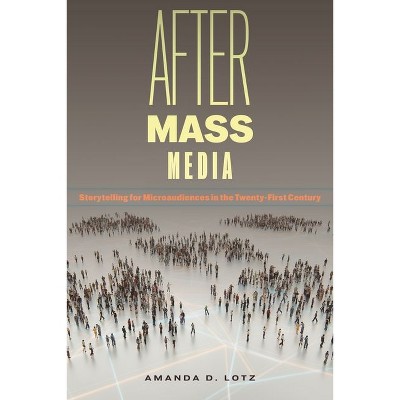Sponsored

Racial Indigestion - (America and the Long 19th Century) by Kyla Wazana Tompkins
$30.49Save $8.51 (22% off)
In Stock
Eligible for registries and wish lists
Sponsored
About this item
Highlights
- Winner of the 2013 Lora Romero First Book Publication Prize presented by the American Studies Association Winner of the 2013 Association for the Study of Food and Society Book Award Part of the American Literatures Initiative Series The act of eating is both erotic and violent, as one wholly consumes the object being eaten.
- About the Author: Kyla Wazana Tompkins is Professor and Chair of Global Gender and Sexuality Studies at the University at Buffalo, and Professor of English at Pomona College.
- 288 Pages
- History, Modern
- Series Name: America and the Long 19th Century
Description
Book Synopsis
Winner of the 2013 Lora Romero First Book Publication Prize presented by the American Studies Association
Winner of the 2013 Association for the Study of Food and Society Book Award Part of the American Literatures Initiative Series The act of eating is both erotic and violent, as one wholly consumes the object being eaten. At the same time, eating performs a kind of vulnerability to the world, revealing a fundamental interdependence between the eater and that which exists outside her body. Racial Indigestion explores the links between food, visual and literary culture in the nineteenth-century United States to reveal how eating produces political subjects by justifying the social discourses that create bodily meaning. Combing through a visually stunning and rare archive of children's literature, architectural history, domestic manuals, dietetic tracts, novels and advertising, Racial Indigestion tells the story of the consolidation of nationalist mythologies of whiteness via the erotic politics of consumption. Less a history of commodities than a history of eating itself, the book seeks to understand how eating became a political act, linked to appetite, vice, virtue, race and class inequality and, finally, the queer pleasures and pitfalls of a burgeoning commodity culture. In so doing, Racial Indigestion sheds light on contemporary "foodie" culture's vexed relationship to nativism, nationalism and race privilege. For more, visit the author's tumblr page: http: //racialindigestion.tumblr.comReview Quotes
"Racial Indigestion is a subtle and wide-ranging study that will be of interest to scholars in nineteenth-century literature, critical race theory, American studies, food studies, and consumer cultures more generally. The originality and depth of the analysis ensures that Racial Indigestion will be a key reference work for years to come."-- "Black Cultural Studies"
"Racial Indigestion is as creative as it is theoretically rigorous and archivally grounded. Tompkins sets forth a marvelous, fruitful array of analytic sites and clever juxtapositions, tracing the politics inherent in the decline of the hearth and the rise of stoves, reimagining the mouth as the window to an alimentary politics, and tracking the post-Reconstruction politics of trade cards. The connections she makes between eating and vernacular culture make the book satisfyingly literary, even as it is so clearly a stellar work of cultural studies."--Elizabeth Freeman, author of Time Binds
"Racial Indigestion provides a highly accessible and well theorized approach to tracing the intersecting resonances between the orality, alimentary, and eroticism of the mouth in literary representation. It will be of great interest to scholars of food studies, African-American studies, and nineteenth-century American literature."-- "Journal of American Culture"
"A dazzlingly original and important contribution to our understanding of nineteenth-century American literature and culture. It brings together the still-emergent field of food studies with Americanist literary and cultural studies, but not in order to . . . apply a set food studies methodology to literature, or merely to trace a theme. Tompkins brings a new lens to bear on the cultural forms of a particular time and place, resulting in new insights into familiar texts but also in new ways of seeing archives that may not have seemed worth further exploration."--Glenn Hendler, Fordham University
"An intrepidly researched meditation on the assertion that 'eating is central to the performance production of raced and gendered bodies in the nineteenth century' (p. 7), Racial Indigestion deserves an enthusiastic readership among scholars in fields ranging from American literary, cultural, and food studies to gender, sexuality, race, and performance theory."--Doris Witt "New England Quarterly"
"Five dense chapters, chronologically arranged, cover a great deal of ground. . . . The best part of Racial Indigestion is a long final chapter on an archival trove of late nineteenth- and early twentieth-century chromolithographed trade cards advertising a variety of food products. The cards are remarkable in the variety of racial actors and scenarios they showcase, and so, simply as an act of archival recovery alone, the chapter performs a most useful service. But Tompkins brings to these cards an analytic subtlety that is little short of dazzling. Refusing to read them as in any way self-evident, she draws attention to their embeddedness in the idioms of vaudeville, minstrelsy, carnival, and other performative traditions."--Parama Roy "Journal of American Studies"
"The best moments in Racial Indigestion come not in the large, embracing statements of cultural analysis but in Tompkins's close and persuasive textual readings."-- "American Quarterly"
"Bold and brilliant."-- "Journal of American History"
"Highly ambitious and fascinating work."--Naomi Lesley "Children's Literature Association Quarterly"
"Kyla Wazana Tompkins's study on eating in nineteenth-century America is mesmerizing. From the playful literary history of children's tales in the antebellum period to the tightly woven cultural analysis of chromo-lithographed trade cards for food products in the Gilded Age, Tompkins convincingly makes the case that eating as a social practice was inextricably tangled with the construction and performance of nineteenth-century American identities."-- "WSQ: Women's Studies Quarterly"
"This text is one of the most theoretically groundbreaking and important 'food studies' texts to date."-- "H-Net Reviews"
"Tompkins' arguments centre around the triad of eating, racial formation and political culture. However, she provides great depth and range to these ideas through the historically rich contextualisation of her artefacts and her elegant articulation of the cultural significance of her analyses."--Tisha Dejmanee, Australian Critical Race and Whiteness Studies Association
About the Author
Kyla Wazana Tompkins is Professor and Chair of Global Gender and Sexuality Studies at the University at Buffalo, and Professor of English at Pomona College. She is the author of Racial Indigestion: Eating Bodies in the Nineteenth Century and managing editor of Keywords for Gender and Sexuality Studies. She is the winner of numerous book awards; in 2023, she won a James Beard Award for her essay "On Boba," published in the Los Angeles Review of Books.Dimensions (Overall): 8.9 Inches (H) x 6.0 Inches (W) x .9 Inches (D)
Weight: 1.2 Pounds
Suggested Age: 22 Years and Up
Number of Pages: 288
Series Title: America and the Long 19th Century
Genre: History
Sub-Genre: Modern
Publisher: New York University Press
Theme: 20th Century
Format: Paperback
Author: Kyla Wazana Tompkins
Language: English
Street Date: July 30, 2012
TCIN: 91572223
UPC: 9780814770030
Item Number (DPCI): 247-33-3218
Origin: Made in the USA or Imported
If the item details aren’t accurate or complete, we want to know about it.
Shipping details
Estimated ship dimensions: 0.9 inches length x 6 inches width x 8.9 inches height
Estimated ship weight: 1.2 pounds
We regret that this item cannot be shipped to PO Boxes.
This item cannot be shipped to the following locations: American Samoa (see also separate entry under AS), Guam (see also separate entry under GU), Northern Mariana Islands, Puerto Rico (see also separate entry under PR), United States Minor Outlying Islands, Virgin Islands, U.S., APO/FPO
Return details
This item can be returned to any Target store or Target.com.
This item must be returned within 90 days of the date it was purchased in store, shipped, delivered by a Shipt shopper, or made ready for pickup.
See the return policy for complete information.
Frequently bought together
Trending Non-Fiction

$19.31
was $20.98 New lower price
4 out of 5 stars with 64 ratings

$4.59
MSRP $7.99
Save $5 when you spend $20 on select books
4.8 out of 5 stars with 123 ratings

$6.20
MSRP $10.95
Save $5 when you spend $20 on select books
4.8 out of 5 stars with 33 ratings

$7.09
MSRP $9.99
Save $5 when you spend $20 on select books
4.9 out of 5 stars with 46 ratings














